Must 的用法
must用法详解

must用法详解今天给大家带来must用法详解,我们一起来学习吧,下面就和大家分享,来欣赏一下吧。
must用法详解1. 表示“必须”、“一定要”(1) 可用于肯定句、否定句或疑问句;用于否定句时,mustn’t 的意思是“一定不要”、“不能”,而不是“不必”。
如:You must finish it today. 你一定要在今天完成它。
You must see the doctor. 你一定要看医生。
Must you go so soon? 你一定得这么早就走吗?We mustn’t think only of ourselves. 我们可不能只考虑自己。
(2) 主要表示现在或将来,但有时(如在间接引语中)也可表过去(=had to)。
如:She asked if she must (had to) leave. 她问她是否一定要离开。
(3) 对于must 开头一般疑问句,若要作否定回答,可用needn’t、dont have to,不用mustn’t。
如:"Must I come over tonight?" "No, you needn’t." “我今晚必须过来吗?”“不必。
”(4) 其后可接被动结构或进行形式。
如:Something must be done to stop it. 必须采取措施来阻止它。
I think I must be going. 我想我得走了。
2. 表示推测意为“准是”、“一定是”,注意以下几点。
如:(1) 通常只用于肯定句,在否定句或疑问句用can 代之。
如:It must be true. 那一定是真的。
比较。
如:Can it be true? 那可能是真的吗? / It can’t be true. 那不可能是真的。
(2) 后接动词原形,表示对现在情况的推测。
如:He must be wrong. 他一定错了。
The man must have a lot of money. 这个人一定有不少钱。
must的用法

must的用法must有必须;应当;很可能的意思,那么你知道must的用法吗?下面跟着店铺一起来学习一下,希望对大家的学习有所帮助!must的用法:表示义务、意图或建议:必须,应该I must leave at six today. 我今天必须六点钟离开。
I must write a letter to the head teacher. 我非得给校长写封信不可。
(强烈意图)You must go and see that film——you'd really enjoy it. 你得去看看那部电影,你会真的喜欢它的。
(提建议)表示推测:必定,一定The light is still on, so he must be at home. 灯还是亮的,他一定在家。
The light was out. They must have gone to bed. 灯都熄了,他们必定睡了。
注意:1. must表示推测时的否定式是can't或couldn't(不可能) ,因为must只用于肯定句,语气很强。
2. 若对过去情况的推测用must have加过去分词。
表示主张:硬要,一定要If you must go, at least wait till the rain stops. 如果你坚持要走,至少也要等雨停了再走。
The machine must break down at this busy hour. 正忙的时候机器偏偏坏了。
表示不可避免性:必然要,必定会All men must die. 人总有一死。
“must+be”“must+be+ v -ing”“must+表示状态的动词”可表示现在或一般的情况; “must+have”表示过去的情况; “must+表示动作的动词”表示将来的情况。
must可表示讽刺或抱怨,此时须以you为主语。
must表示客观上不愉快的情况,意为“偏偏”。
must的用法总结归纳
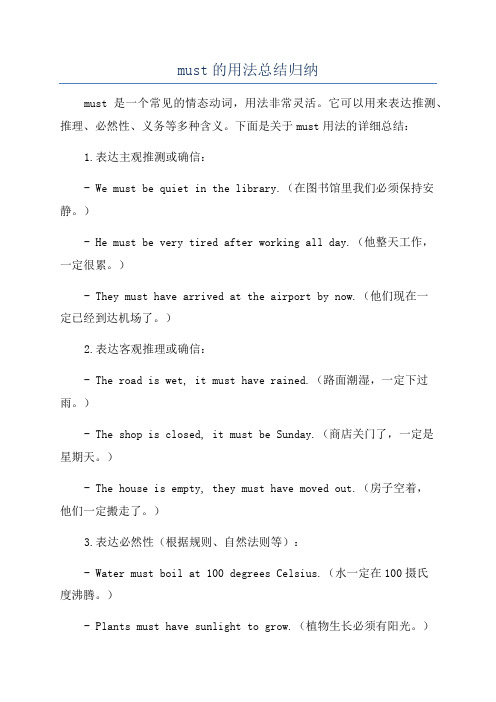
must的用法总结归纳must是一个常见的情态动词,用法非常灵活。
它可以用来表达推测、推理、必然性、义务等多种含义。
下面是关于must用法的详细总结:1.表达主观推测或确信:- We must be quiet in the library.(在图书馆里我们必须保持安静。
)- He must be very tired after working all day.(他整天工作,一定很累。
)- They must have arrived at the airport by now.(他们现在一定已经到达机场了。
)2.表达客观推理或确信:- The road is wet, it must have rained.(路面潮湿,一定下过雨。
)- The shop is closed, it must be Sunday.(商店关门了,一定是星期天。
)- The house is empty, they must have moved out.(房子空着,他们一定搬走了。
)3.表达必然性(根据规则、自然法则等):- Water must boil at 100 degrees Celsius.(水一定在100摄氏度沸腾。
)- Plants must have sunlight to grow.(植物生长必须有阳光。
)- You must wear a seatbelt when driving.(开车时必须系安全带。
)4.表达义务、强制或责任:- We must follow the rules.(我们必须遵守规定。
)5.表示建议或命令:- You must read this book, it's really interesting.(你必须读这本书,它非常有趣。
)- You must stop smoking for your health.(为了健康,你必须戒烟。
)6.表达事实或不可怀疑:- It must be cold outside, everyone is wearing coats.(外面一定很冷,大家都穿着外套。
must情态动词用法
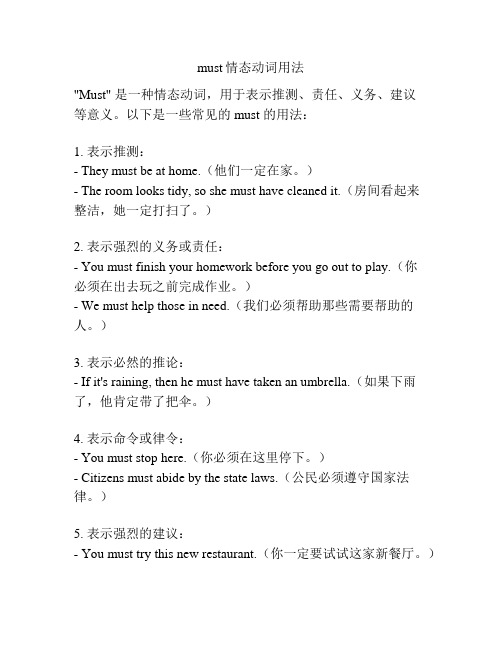
must情态动词用法"Must" 是一种情态动词,用于表示推测、责任、义务、建议等意义。
以下是一些常见的 must 的用法:1. 表示推测:- They must be at home.(他们一定在家。
)- The room looks tidy, so she must have cleaned it.(房间看起来整洁,她一定打扫了。
)2. 表示强烈的义务或责任:- You must finish your homework before you go out to play.(你必须在出去玩之前完成作业。
)- We must help those in need.(我们必须帮助那些需要帮助的人。
)3. 表示必然的推论:- If it's raining, then he must have taken an umbrella.(如果下雨了,他肯定带了把伞。
)4. 表示命令或律令:- You must stop here.(你必须在这里停下。
)- Citizens must abide by the state laws.(公民必须遵守国家法律。
)5. 表示强烈的建议:- You must try this new restaurant.(你一定要试试这家新餐厅。
)需要注意的是,must 在疑问句和否定句中使用上有一些限制,通常用 "have to" 来代替:- Do you have to go to the meeting?(你必须去开会吗?)- She doesn't have to work on Sundays.(她不必在星期天工作。
)。
must用法归纳与总结

must用法归纳与总结must是英语中的一个常用词,它可以用于不同的语境中表达不同的含义。
下面将对must的用法进行归纳和总结,包括用于陈述句、疑问句、否定句和条件句的情况。
1. 用于陈述句表示强烈的建议或要求在陈述句中,must可以表示强烈的建议或要求。
例如:You must finish your homework.(你必须完成你的作业。
)We must go to the airport immediately.(我们必须立即去机场。
)在这种语境中,must强调了建议或要求的强烈程度,表达了说话者对听者的期望或要求。
2. 用于疑问句表示询问或反问在疑问句中,must可以表示询问或反问。
例如:Must I finish my homework?(我必须完成我的作业吗?)Must you go to the airport immediately?(你必须立即去机场吗?)在这种语境中,must表示对某个问题或情况的询问或反问,表达了听者对说话者建议或要求的疑问或不理解。
3. 用于否定句表示禁止、阻止、不许、必须在否定句中,must可以表示禁止、阻止、不许、必须等含义。
例如:You must not smoke in the elevator.(禁止在电梯内吸烟。
)You must not park here.(禁止在此停车。
)在这种语境中,must表示禁止、阻止、不许、必须等含义,表达了说话者对某些行为或操作的禁止或限制。
4. 用于条件句表示必须、必要在条件句中,must可以表示必须、必要的含义。
例如:If you want to go to the party, you must RSVP by Friday.(如果你想参加聚会,必须在星期五之前回复。
)If you want to graduate, you must pass all your exams.(如果你想毕业,必须通过所有的考试。
must 的用法

must 的用法
must是一个情态动词,用于表示强烈的命令、义务或推断。
它可以用于不同的语境中,包括肯定陈述、否定陈述、疑问句和条件句中。
下面是一些具体的用法:
1. 表示强制性的命令或建议:You must wear a helmet when riding a motorcycle.(骑摩托车时必须戴头盔。
)
2. 表示责任或义务:I must finish this report tonight.(我必须今晚完成这份报告。
)
3. 表示非常有可能的推断:He must be exhausted after running a marathon.(他跑完马拉松一定累坏了。
)
4. 在条件句中表示必须满足的条件:You must pass the exam if you want to graduate.(如果你想毕业,你必须通过考试。
)
5. 在虚拟语气中表示强烈的愿望或建议:I wish I could go on vacation.(我真希望能去度假。
)
6. 表示对某种事实的确认:That must be the bus we need to take.(那一定是我们要坐的那辆公交车。
)
总之,must是一个常用的情态动词,用于表示强烈的命令、义务或推断。
在语境中正确使用must可以让我们的表达更加清晰和准确。
- 1 -。
must的用法总结
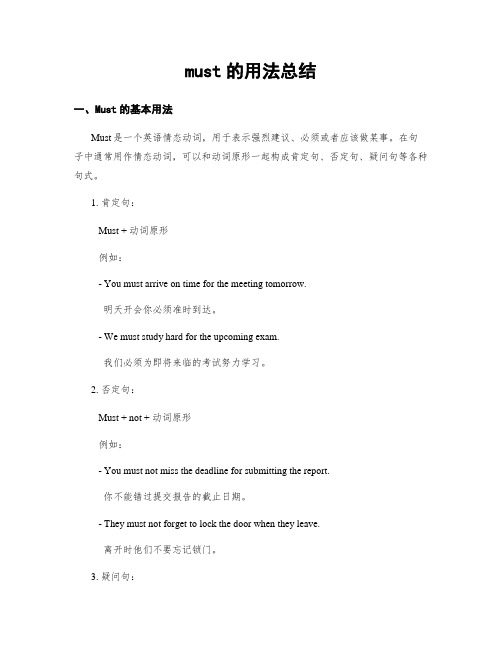
must的用法总结一、Must的基本用法Must是一个英语情态动词,用于表示强烈建议、必须或者应该做某事。
在句子中通常用作情态动词,可以和动词原形一起构成肯定句、否定句、疑问句等各种句式。
1. 肯定句:Must + 动词原形例如:- You must arrive on time for the meeting tomorrow.明天开会你必须准时到达。
- We must study hard for the upcoming exam.我们必须为即将来临的考试努力学习。
2. 否定句:Must + not + 动词原形例如:- You must not miss the deadline for submitting the report.你不能错过提交报告的截止日期。
- They must not forget to lock the door when they leave.离开时他们不要忘记锁门。
3. 疑问句:Must + 主语 + 动词原形?例如:- Must we finish this task by tomorrow?我们必须明天完成这项任务吗?- Must I bring my own laptop to the workshop?我必须带自己的笔记本电脑参加研讨会吗?二、Must的用法总结1. 表示根据道德规范或者法律规定必须做或者不做某事。
例如:- You must obey the rules of the library.你必须遵守图书馆的规定。
- Citizens must pay taxes on time.公民必须按时缴纳税款。
2. 表示根据逻辑、常识或者经验判断,某种行为是非常确凿的真理或者必然的结果。
例如:- The sun must rise in the east and set in the west.太阳肯定从东方升起,西方落下。
- You must be tired after working for such a long time.在工作了这么长时间之后,你一定累了。
must用法情态动词
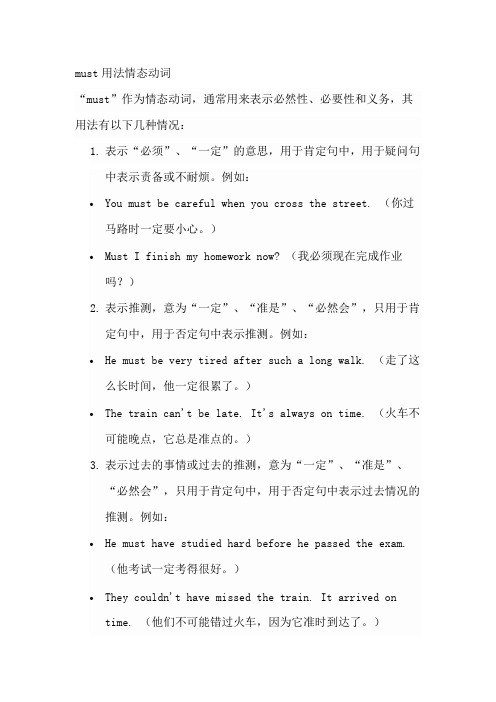
must用法情态动词“must”作为情态动词,通常用来表示必然性、必要性和义务,其用法有以下几种情况:1.表示“必须”、“一定”的意思,用于肯定句中,用于疑问句中表示责备或不耐烦。
例如:•You must be careful when you cross the street. (你过马路时一定要小心。
)•Must I finish my homework now? (我必须现在完成作业吗?)2.表示推测,意为“一定”、“准是”、“必然会”,只用于肯定句中,用于否定句中表示推测。
例如:•He must be very tired after such a long walk. (走了这么长时间,他一定很累了。
)•The train can't be late. It's always on time. (火车不可能晚点,它总是准点的。
)3.表示过去的事情或过去的推测,意为“一定”、“准是”、“必然会”,只用于肯定句中,用于否定句中表示过去情况的推测。
例如:•He must have studied hard before he passed the exam.(他考试一定考得很好。
)•They couldn't have missed the train. It arrived on time. (他们不可能错过火车,因为它准时到达了。
)4.表示强烈的建议或命令,意为“必须”、“一定要”,用于肯定句中,用于否定句中表示强烈的不满或抱怨。
例如:•You must come to see me before you leave. (你一定要在离开前来看我。
)•You mustn't forget to turn off the lights before you leave. (你千万不要忘记关灯。
)5.表示推测或可能性的程度,意为“大概”、“或许”、“极有可能”,用于肯定句中,用于否定句中表示不太可能的推测。
情态动词must用法大全

情态动词must的用法大全情态动词must是英语中一个十分常用的动词,它可以表达多种含义和用法。
下面是must的一些主要用法:1. 表示必须、必要情态动词must可以表示必须、必要的意思,其后可以接用不定式或动名词,但不可接不定式的完成体形式,表示“一…就…”。
例如:I must go now. (我现在必须走了。
)You must finish your homework before you can watch TV. (你必须先完成作业才能看电视。
)2. 表示坚决、坚持的意思情态动词must可以表示坚决、坚持的意思,通常用于肯定句。
例如:I must say, your attitude is unacceptable. (我必须说,你的态度是不可接受的。
)They must continue their search for the missing child. (他们必须继续寻找失踪的孩子。
)3. 表示推测,指有把握的猜测断定情态动词must可以表示推测,指有把握的猜测断定。
例如:He must be in the office. (他肯定在办公室里。
)They must have finished their work already. (他们肯定已经完成了工作。
)4. 表示征求对方意见,意为“要不要”情态动词must可以表示征求对方意见,意为“要不要”。
例如:Do you think we must invite them to the party? (你认为我们必须邀请他们参加聚会吗?)Shall we continue or must we stop? (我们要继续还是停下来?)5. 表示禁止、不允许的意思情态动词must还可以表示禁止、不允许的意思。
例如:You mustn't smoke in the hospital. (你不许在医院里吸烟。
)No one must enter the restricted area without permission. (未经允许,任何人不得进入禁区。
must的用法及短语

must的用法及短语一. must的用法1. must作为助动词,表示强烈的义务或需要,常用于肯定句中。
例如:- You must submit your assignment by Friday.(你必须在星期五前提交你的作业。
)- We must always follow the safety instructions.(我们必须始终遵守安全说明。
)2. must可以用于表示推测或断定某事是非常可能发生的。
例如:- It's midnight, and she's not home yet. She must be stuck in traffic.(现在已经半夜了,而她还没回家。
她一定被堵在交通堵塞里了。
)- He hasn't eaten anything all day. He must be starving.(他整天都没有吃东西。
他一定饿坏了。
)3. 在过去的时态中,must有两种形式:must和had to。
- must用于表达过去时态中主观的推测、肯定意愿或授权。
例:He said his parents and sister would visit him that day, so he knew he must clean his apartment.他说他父母和姐姐可能那天会来看望他,所以他知道自己得打扫公寓。
- had to用于表达过去时态中不由选择、不得不做某事。
例:I had no other option but to ride my bike to work when my car broke down.我的车坏了,我别无选择只能骑自行车上班。
二. must的常用短语1. must-see:必看的- The Grand Canyon is a must-see if you're ever in Arizona.(如果你曾经在亚利桑那州,大峡谷是必看的)- My friend recommended a must-see movie that just came out in theaters.(我的朋友推荐了一部最新上映并值得一看的电影。
must的用法及例句

must的用法及例句一、must的用法must是一个情态动词,用于表示强烈的义务、必要性和推断。
在英语中,我们常常使用must来表达对某事的肯定判断或假设。
下面将介绍must的用法,并给出一些例句以帮助理解。
1. 表示强制性的义务Must可以用来表达人们必须遵守或执行的法律、规则或规定。
它传达了一种强烈程度,并暗示没有其他选择。
例句:- You must wear a seatbelt while driving.你开车时必须系安全带。
- Students must complete their homework by tomorrow.学生们必须在明天之前完成作业。
2. 表示强烈推测或相当确定Must还可以用来表达对某事物非常有把握、认为几乎肯定会发生的推断。
例句:- The weather is so sunny. It must be a perfect day for a picnic.天气这么晴朗,很可能是个适合野餐的好日子。
- He has been studying all night long, so he must pass the exam.他整晚都在学习,所以他应该会通过考试。
3. 表示客观存在和真实性Must也可用于陈述某种客观现实、规律或普遍真理。
例句:- Water boils at 100 degrees Celsius. (Boiling point of water)水在摄氏100度时沸腾。
(水的沸点)- You must trust yourself before others can trust you.别人信任你之前,你必须要相信自己。
4. 表示对现在和过去发生的事物的猜测Must还可用于推测已经发生或正在发生的事情。
例句:- The door is wide open. Someone must have forgotten to close it.门敞开着,一定是有人忘记关上了。
must的用法和固定搭配

must的用法和固定搭配一、介绍Must是一个常用的情态动词,它在英语中有着多种用法和固定搭配。
本文将重点讨论must的用法和固定搭配,并提供相关例句来帮助读者更好地理解该词的使用。
二、表示义务或强烈建议1. 表示必须做某事:当我们想要表达某个行为是必须要做的,就可以使用must。
例如:- You must hand in your assignment by tomorrow.(你必须在明天之前交作业。
)- We must follow the school rules.(我们必须遵守学校规定。
)2. 表示强烈建议:当我们想向他人提出明确的建议时,也可以使用must。
例如:- You must try this restaurant, the food is amazing!(你一定要去尝试这家餐厅,食物非常美味!)- I think you must read this book, it's very informative.(我认为你一定要读这本书,它非常有价值。
)三、表示推断或肯定性1. 表示推断:当我们根据某种证据或迹象作出合理的推测时,可以使用must表达对某件事情的推断。
例如:- It's already 10 o'clock, he must be asleep now.(现在已经十点了,他肯定在睡觉。
)- The road is wet, it must have rained earlier.(路面潮湿,肯定之前下过雨。
)2. 表示肯定性:当我们想要强调某个陈述的真实性时,可使用must来表示确定或确信的态度。
例如:- He's been studying very hard, he must be well-prepared for the exam.(他一直努力学习,一定准备好考试了。
)- Despite his young age, he must be very talented to play the piano so well.(尽管他年纪还小,但他一定很有天赋才能演奏得这么好。
must的用法
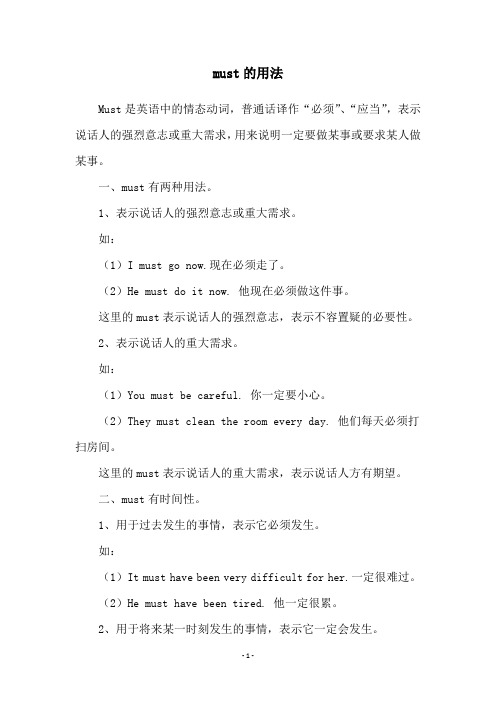
must的用法Must是英语中的情态动词,普通话译作“必须”、“应当”,表示说话人的强烈意志或重大需求,用来说明一定要做某事或要求某人做某事。
一、must有两种用法。
1、表示说话人的强烈意志或重大需求。
如:(1)I must go now.现在必须走了。
(2)He must do it now. 他现在必须做这件事。
这里的must表示说话人的强烈意志,表示不容置疑的必要性。
2、表示说话人的重大需求。
如:(1)You must be careful. 你一定要小心。
(2)They must clean the room every day. 他们每天必须打扫房间。
这里的must表示说话人的重大需求,表示说话人方有期望。
二、must有时间性。
1、用于过去发生的事情,表示它必须发生。
如:(1)It must have been very difficult for her.一定很难过。
(2)He must have been tired. 他一定很累。
2、用于将来某一时刻发生的事情,表示它一定会发生。
如:(1)You must leave tomorrow. 你明天必须离开。
(2)I must be back by three oclock. 三点前我必须回来。
三、must可以用于疑问句和否定句。
1、用于疑问句,表示确信地询问对方的意见或要求对方的决定,人称代词要改成疑问代词。
如:(1)Must I go now?现在必须走吗?(2)Must we do it now?们现在必须做这件事吗?2、用于否定句,表示说话人拒绝做某事或为保持一定的语气。
如:(1)You must not go there. 你不该去那里。
(2)I must not forget to do it.不可以忘记做这件事。
以上所述是must的用法,必须牢记must有两种用法,有时间性,可以用于疑问句和否定句,以便更准确地使用must这个词。
(完整版)must的用法

• Must you make so much noise? • 你就非得弄出这么大的声音吗?
(4) must 与 have to 的区别
• 两者都表示“必须”,但••m认u为st有侧必重要于或说有话义者务的去主做观某看事法;,
have to 则重于客观需要,含有“不得不”“被迫”之意。
•
副词不能放在动词和宾语之间。
• must主要表示现在或将来,但在间接引语中也可表过去 • must 的过去时是 had to • She asked her boss if she must (had to) work overtime.
• 对于must开头的一般疑问句,若作否定回答,可以用needn’t, 不用 mustn’t。如:
一定是走这条路来的,这里还有他的脚印呢。
• (3) 表示“偏偏” • 有时must可表示某事发生得不早不迟,就在某个当紧的时候,多
指某些不受欢迎的事情的发生。如:
The car must break down just we were starting our holidays.
我们刚刚开始休假,汽车偏偏坏了。
Must you worry her with questions, just when she is busy cooking dinner? 她正忙着做饭你干吗偏偏问她问题?
• Just when I was busy, the neighbor must come and chatter. • 正当我忙碌的时候,邻居偏偏过来聊天。 • 有时还可指主观上的偏执或固执,常可译为“偏”“偏要”。如: • After I gave her my advice,she must go and do the opposite.
must的用法总结

must的用法总结"Must" 是英语中的一个情态动词,表示强烈的必要性或必然性。
以下是"must" 的用法总结:1. 表示强烈的必要性或必然性:Must 表示必要或必须做某事,通常用于现在和将来的情况。
You must finish this project before the deadline. (你现在必须完成这个项目。
)2. 表示推测:Must 也可以用于表示对过去情况的推测,通常用于肯定句。
She must have gone to the store, because the fridge is full of groceries. (她一定去过商店了,因为冰箱里装满了杂货。
)3. 否定形式:Don't must 表示不必或不需要做某事。
You don't have to finish this project today. (你不必今天完成这个项目。
)4. 与疑问句:Must 用于疑问句时,通常表示建议或询问对方的意愿。
Must I finish this project today? (我必须今天完成这个项目吗?)5. 其他用法:Must 还可以表示“绝对”、“肯定”等含义。
It must be fate that we met each other. (我们相遇肯定是命运的安排。
)6. 与虚拟语气结合:在某些语境中,must 可以与虚拟语气结合使用,表示与实际情况相反的情况。
If only I had known, I must have warned you. (要是早知道的话,我一定会警告你的。
)7. 与情态动词的替代:在某些情况下,must 可以被其他情态动词替代,如should、ought to等。
You should finish this project as soon as possible. (你应该尽快完成这个项目。
must的用法

She is not at home. She must be out. 她不在家里,她一定外出了。
注意:must表示推测,用于反意疑问句时,疑问部分不能用must, 应与其后面的动词保持一致。如:
(1)She must be home, isn’t she? 她一定在家里,是吗?
must是情态动词,没有人称或数的变化,后接动词原形,其主要用法如下:
1.表示义务或必要性,意思是“应该、必须”,通常用于肯定句及疑问句。如:
You must go to bed now. 你现在必须睡觉了。
Must I start at once? 我必须立刻出发吗?
—Must I stay at home? 我必须留在家留在家里。
(No, you needn’t. 或No, you don’t have to.)(不,不用了。)
如果是反意疑问句,疑问部分一般不用needn’t, 而用mustn’t;否定回答时仍用needn’t, don’t need to或don’t have to. 如:
2.must的否定式是must not/ mustn’t,意思是“不应该、禁止”,语气较强烈。如:
You must not smoke here. 你不许在这里吸烟。
We mustn’t be late again. 我们不应该再迟到了。
3.由must引出的一般疑问句,肯定回答用must,否定回答用needn’t, don’t need to或don’t have to均可,但不用mustn’t,因为mustn’t表示“不许、禁止”的意思,与问句的原意不符。如:
(2)Tom must have a sister, hasn’t he? / doesn’t he? 汤姆肯定有一个妹妹,是吗?
情态动词must的用法大全

情态动词must的用法大全情态动词must是英语中一个重要的动词,它有多种用法,可以表示必要性、推测、禁止、义务、可能性等。
下面是对must用法的全面总结:1. 表示必要性must可以表示必要性,表示“必须”或“应该”做某事。
例如:“You must finish your homework.”(你必须完成你的作业。
)2. 表示推测must可以表示推测,通常用于肯定句中,表示“一定”、“想必”等意思。
例如:“He must be in the office now.”(他现在一定在办公室里。
)3. 表示禁止must也可以表示禁止,通常用于否定句中,表示“不可以”、“不允许”等意思。
例如:“You must not smoke here.”(你不允许在这里吸烟。
)4. 表示义务must还可以表示义务,即因为某种原因而应该做某事。
例如:“You must help your mother with the housework.”(你应该帮你妈妈做家务。
)5. 表示可能性must也可以表示可能性,即某事很可能会发生。
例如:“It must rain later.”(一会儿肯定会下雨。
)6. 表示肯定推测must表示肯定推测时,通常用于肯定句中,表示有把握认为某事是真实的。
例如:“He must be at home now.”(他现在肯定在家。
)7. 表示推测的程度must可以用来表示推测的程度,即根据某种迹象或线索来推测某事的可能性。
例如:“He must have finished his work.”(他一定已经完成了他的工作。
)8. 表示征求意见must也可以用来征求意见,通常用于疑问句中。
例如:“Must I go now?”(我现在必须走吗?)9. 表示对过去情况的推测must用于过去情况的推测时,需要使用完成式或过去完成式。
例如:“They must have finished their work yesterday.”(他们昨天一定已经完成了他们的工作。
must的用法
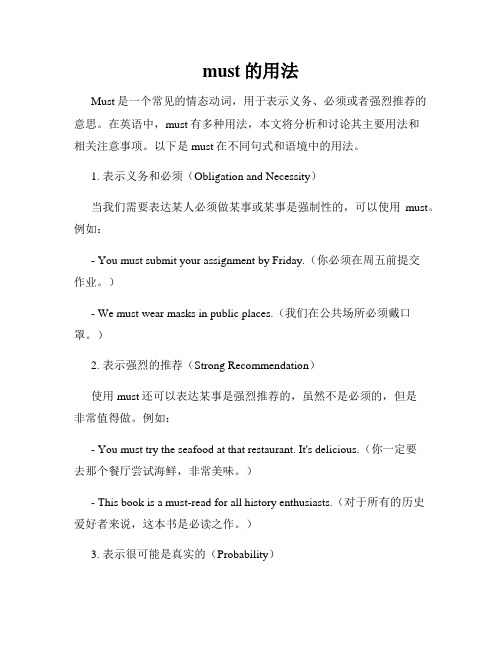
must的用法Must是一个常见的情态动词,用于表示义务、必须或者强烈推荐的意思。
在英语中,must有多种用法,本文将分析和讨论其主要用法和相关注意事项。
以下是must在不同句式和语境中的用法。
1. 表示义务和必须(Obligation and Necessity)当我们需要表达某人必须做某事或某事是强制性的,可以使用must。
例如:- You must submit your assignment by Friday.(你必须在周五前提交作业。
)- We must wear masks in public places.(我们在公共场所必须戴口罩。
)2. 表示强烈的推荐(Strong Recommendation)使用must还可以表达某事是强烈推荐的,虽然不是必须的,但是非常值得做。
例如:- You must try the seafood at that restaurant. It's delicious.(你一定要去那个餐厅尝试海鲜,非常美味。
)- This book is a must-read for all history enthusiasts.(对于所有的历史爱好者来说,这本书是必读之作。
)3. 表示很可能是真实的(Probability)在某些情况下,must也可以用来表示根据某种推测或判断,某事很可能是真实的。
例如:- He has been studying all night. He must be tired.(他通宵学习了,他一定很累。
)- They haven't called yet. They must have forgotten about our meeting.(他们还没有打电话,他们可能忘记了我们的会议。
)4. 表示禁止(Prohibition)在固定的句式 "must not" 中,must用来表示禁止做某事。
- 1、下载文档前请自行甄别文档内容的完整性,平台不提供额外的编辑、内容补充、找答案等附加服务。
- 2、"仅部分预览"的文档,不可在线预览部分如存在完整性等问题,可反馈申请退款(可完整预览的文档不适用该条件!)。
- 3、如文档侵犯您的权益,请联系客服反馈,我们会尽快为您处理(人工客服工作时间:9:00-18:30)。
Must 的用法:
1. must (“必须”, 主观上的) / have to (“不得不”, 客观上的)
2. must / need 提问, 其肯定答语用must , 否定答语用needn’t
3. mustn’t 表示禁止
4. 用于猜测句型, 表语气很强的肯定句中. “一定….”
5. 表示人的一种固执“偏要”“非…不可” (指做令人不愉快的事)
6. 做名词: “必须有的东西/做的事”
Exercises:
1. I can’t find my key. It ____ in my offi ce.
A. can be forgotten
B. can be left
C. must have been forgotten
D. must have been left
2.---What’s that terrible smell?
---Oh, I forgot about the chicken! Go and look, it ______!
A. may be burnt
B. ought to be boiling
C. can be cooking
D. must be burning
3. “Oh, peter, you are running a high fever. You ____ go to see a doctor or you’ll miss the entrance exam.” Said the teacher.
A. must
B. should
C. might C. could
4.---_____ you make so much noise?
---Sorry. I’ll take care n ot to.
A. Can
B. Must
C. May
D. Would
5.I really _____ go ; I shall miss my bus if I don’t hurry.
A. can
B. might
C. will
D. must
6. You _____ use the office phone for private calls during working time. It’s not permitted.
A. need n’t
B. mustn’t
C. may not
D. won’t
7.---Wake up, Peter. Time to rise.
---I ____ asleep while I was reading
A. must fall
B. could fall
C. must have fallen
D. should have fallen
8.---_____ I book a table for dinner a few days ahead of time?
---Yes, you ____. The restaurant is always full, especially during the holidays.
A. Must, will
B. Must, can
C. Shall, shall
D. Shall, must
9.Little Tom ____ have finished his homework; otherwise, he wouldn’t be listening to music.
A. can
B. shall
C. must
D. would
10.Apologize? ______ I ? It was all her own fault.
A. May
B. Shall
C. Should
D. Must
11.So long as there are more people than needed, there _____ be tests to help make a fairer decision.
A. can
B. may
C. shall
D. must
12.____ you take a taxi? There is still plenty of time.
A. Can
B. Will
C. Must
D. Should
13.---Tom is never late for work. Why is he absent today?
---Something ____ to him.
A. must happen
B. should have happened
C. could have happened
D. must have happened
14.The examination _____ very difficult since only a few of the students passed.
A. could have been
B. must have been
C. might have been
D. would have been
15.---I phoned Tom yesterday evening , but nobody answered the phone.
---Oh, he _____ .
A. must be sleeping
B. must slept
C. must have been sleeping
D. could be sleeping
16.Don’t interrupt me, John. ____ you force me to tell you the truth at the moment?
A. Might
B. Must
C. Should
D. Will
17.All my family are looking forward to meeting you. You ____ come over and have dinner with us this weekend.
A. will
B. must
C. may
D. shall
18.---Can I surf the Internet tonight?
---Sure. However, in no case _____ you do it alone.
A. could
B. might
C. must
D. need
Answers: 1-5 DDABD 6-10 BCDCD 11-15 DCDBC 16-20 BBC。
